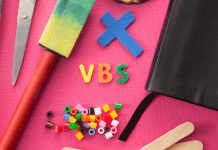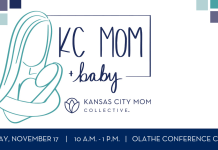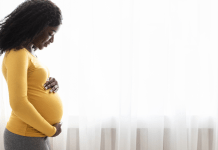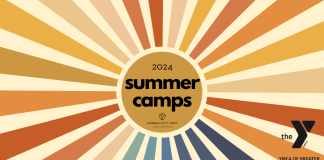If you’re brave or lucky enough to be an older mom (aka over 35), you’ll know there’s a lot of indignity and humiliation that comes with it. While you’re trying to get pregnant, news art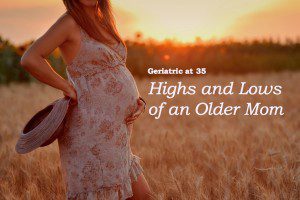 icles will warn you you’ve left it too late and come up with all sorts of statistics on your depleting fertility. When you’re pregnant your doctor will subject you to a whole raft of extra screenings, procedures and monitoring that younger moms just don’t hear about it. In addition you’ll see “AMA” – Advanced Maternal Age on all your files. Which is actually not so bad as the United Kingdom, where you’ll be labeled “geriatric.”
icles will warn you you’ve left it too late and come up with all sorts of statistics on your depleting fertility. When you’re pregnant your doctor will subject you to a whole raft of extra screenings, procedures and monitoring that younger moms just don’t hear about it. In addition you’ll see “AMA” – Advanced Maternal Age on all your files. Which is actually not so bad as the United Kingdom, where you’ll be labeled “geriatric.”
When I gave birth to my first born at 37, nurses seemed to read my chart, taking in my age before doing a double take that I still had all my own teeth. “You look fit and healthy for your age.” What do you say to that – thank you?
But who cares right? I was lucky to be pregnant at all at my age, according to all those articles. Except that I knew better. Another older mom, had given me a copy of Jean Twenge’s book The Impatient Woman’s Guide to Getting Pregnant, also a shortened version appeared in the Atlantic which found that research suggesting a woman’s fertility dropped after 35 was based on studies in 1850 France. “In other words, millions of women are being told when to get pregnant based on statistics from a time before electricity, antibiotics, or fertility treatment.” Twenge suggested as long as you had sex twice a week, ate healthily and knew when you ovulated, you were in with a fighting chance. I got lucky. My son is living proof that her advice can work.
But this fear of time running out is so strong. I remember years earlier sitting in a bar with a good friend who comforted me during the break up of my first marriage. I was 33 and convinced that that was it for me. I would never meet anyone else ever again, and I was going to miss out on being a mother. I cried in public as my friend headed to the bar for more wine. The conversation of two women opposite us came into earshot: “I’m 28, if we break up now, I won’t have time to meet someone else, and won’t have a chance to be a mother.” How I wanted to be in her shoes. From where I was sitting, 28 was plenty of time. So it turned out was 33.
I think it always feels too late.That you don’t have time. This year, at 39, I lost my second pregnancy. Losing a baby will always hurt. This I know from the wonderful women around me who so beautifully shared their empathy with me and from all the wonderful blogs that have been written about this difficult experience. But for a while, for all their words, I was so angry. Because I don’t think anyone understood that it was different for me. I am 39. In my mind, that was my last chance. I would never have a second child. I was out of time. Because the risk of miscarriage, genetic abnormalities, issues that affect brain, kidney, heart, lung, spinal cord and skeletal development all increase with age. Dr. Google abounds with tools to help you calculate your age related risk. Here are two well-cited and comprehensive ones, on miscarriage and genetic disorders. At 40, the respective risks rise to 2% chance of miscarriage and 3% chance of abnormality.
These statistics haunted me. Next year, I will be 40. Even Jean Twenge says things get a little harder at 40. But they are not impossible. Over time, my perspective has shifted. If you flip those statistics around, you have a 98% chance of NOT having a miscarriage and 97% chance of a healthy child. If those were your chances of winning the lottery, you’d certainly buy a ticket. I am not saying I am going to win next time round, but I think it’s worth another try.
And the stats say I’m not alone. Last year, 4% of all births in Missouri and Kansas by women over 40. And this figure is rising year on year. In the UK, the birth rate of woman over 40 has trebled in the last 15 years, and women are increasingly having children well into their late 40s and 50s. Recent reports suggests that this rise in older moms is putting pressure on medical staff struggling to cope with the correlated rise in more complicated births.
So there’s more of us, and we’re more complicated. We are more likely to suffer ectopic pregnancy, gestational diabetes during pregnancy, and higher risk of caesarean section or induced labor. Our pregnancy and labor & delivery comes with more risk, but we are not high risk. Research has shown that when it comes to delivery, routinely treating older woman as high risk can be a self-fulfilling prophecy and require more interventions during birth.
OlderMum, a UK website dedicated to this growing trend recommends educating yourself on the birth process, and ensuring you ask sufficient questions to prevent unnecessary interventions. The site also offers lots of support on conceiving and taking a healthy pregnancy to term by focusing on a healthy diet of whole foods; reducing processed, food, alcohol, caffeine and sugar. There is increasing evidence that taking extra folic acid can also help prevent spinal problems. Other sites with helpful information include Mothers35plus, AdvancedMaternalAge and achildover40.
On the bright side, research found that women who can have a child naturally after 33 might have the genes to live longer and be less likely to suffer from certain cancers. While other research says that older moms often have more established careers and are more financially stable, which can lead to a more family focused approach and better outcomes for child development.
This year, as I waited to find out if my baby was going to live, I attended a pre-natal yoga class where the teacher closed the class with this quote from Maya Angelou:
Courage is the most important of all virtues, because without courage you can’t practice any other virtue consistently.
It certainly does take a lot of courage to be an older mom, but the heartache of loss has made me realize how precious and perfect my firstborn is, and how motherhood is a virtue worth fighting for.




